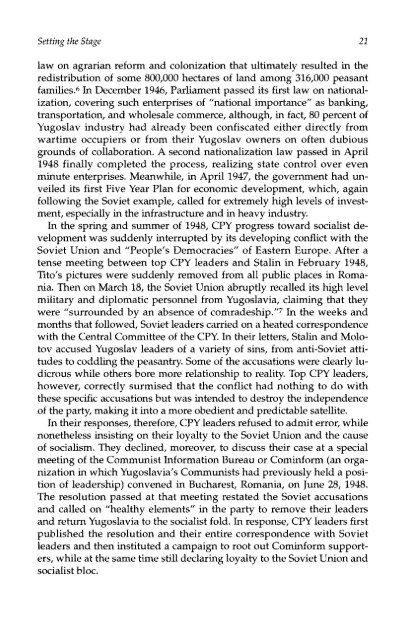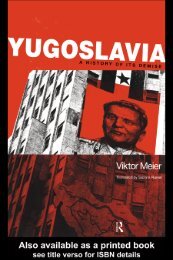Part Two - Indymedia
Part Two - Indymedia
Part Two - Indymedia
You also want an ePaper? Increase the reach of your titles
YUMPU automatically turns print PDFs into web optimized ePapers that Google loves.
Setting the Stage 21<br />
law on agrarian reform and colonization that ultimately resulted in the<br />
redistribution of some 800,000 hectares of land among 316,000 peasant<br />
families. 6 In December 1946, Parliament passed its first law on nationalization,<br />
covering such enterprises of "national importance" as banking,<br />
transportation, and wholesale commerce, although, in fact, 80 percent of<br />
Yugoslav industry had already been confiscated either directly from<br />
wartime occupiers or from their Yugoslav owners on often dubious<br />
grounds of collaboration. A second nationalization law passed in April<br />
1948 finally completed the process, realizing state control over even<br />
minute enterprises. Meanwhile, in April 1947, the government had unveiled<br />
its first Five Year Plan for economic development, which, again<br />
following the Soviet example, called for extremely high levels of investment,<br />
especially in the infrastructure and in heavy industry.<br />
In the spring and summer of 1948, CPY progress toward socialist development<br />
was suddenly interrupted by its developing conflict with the<br />
Soviet Union and "People's Democracies" of Eastern Europe, After a<br />
tense meeting between top CPY leaders and Stalin in February 1948,<br />
Tito's pictures were suddenly removed from all public places in Romania.<br />
Then on March 18, the Soviet Union abruptly recalled its high level<br />
military and diplomatic personnel from Yugoslavia, claiming that they<br />
were "surrounded by an absence of comradeship." 7 In the weeks and<br />
months that followed, Soviet leaders carried on a heated correspondence<br />
with the Central Committee of the CPY. In their letters, Stalin and Molotov<br />
accused Yugoslav leaders of a variety of sins, from anti-Soviet attitudes<br />
to coddling the peasantry. Some of the accusations were clearly ludicrous<br />
while others bore more relationship to reality. Top CPY leaders,<br />
however, correctly surmised that the conflict had nothing to do with<br />
these specific accusations but was intended to destroy the independence<br />
of the party, making it into a more obedient and predictable satellite.<br />
In their responses, therefore, CPY leaders refused to admit error, while<br />
nonetheless insisting on their loyalty to the Soviet Union and the cause<br />
of socialism. They declined, moreover, to discuss their case at a special<br />
meeting of the Communist Information Bureau or Cominform (an organization<br />
in which Yugoslavia's Communists had previously held a position<br />
of leadership) convened in Bucharest, Romania, on June 28, 1948.<br />
The resolution passed at that meeting restated the Soviet accusations<br />
and called on "healthy elements" in the party to remove their leaders<br />
and return Yugoslavia to the socialist fold. In response, CPY leaders first<br />
published the resolution and their entire correspondence with Soviet<br />
leaders and then instituted a campaign to root out Cominform supporters,<br />
while at the same time still declaring loyalty to the Soviet Union and<br />
socialist bloc.
















